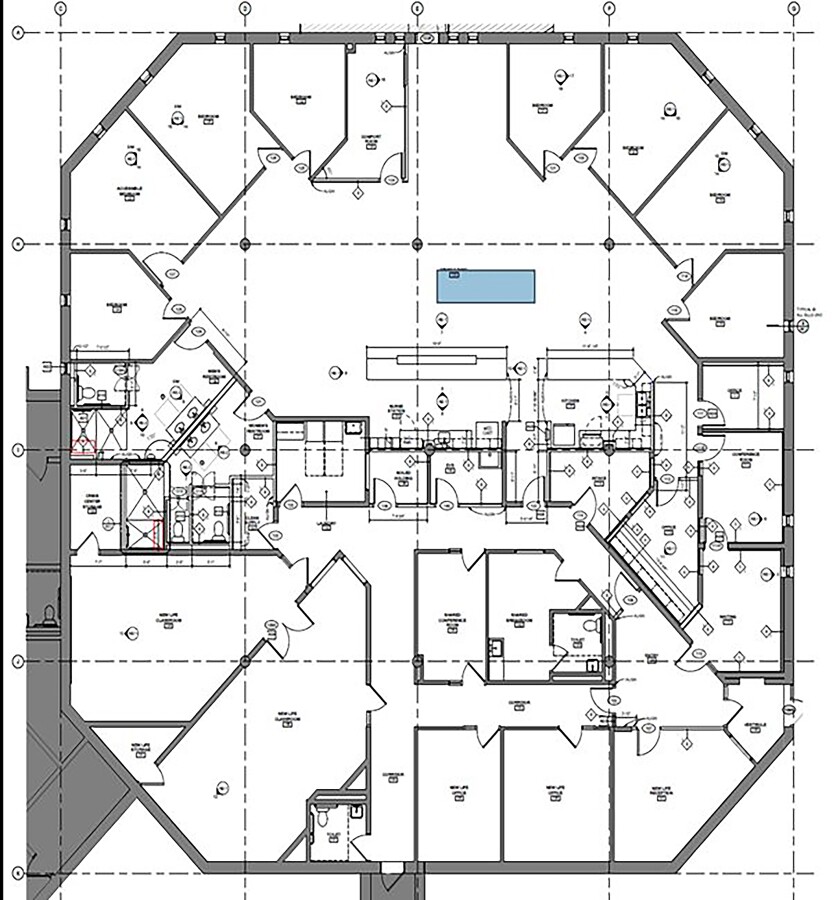WORTHINGTON — Nobles County will soon be home to a short-term behavioral health stabilization center. To be located in the former Kids’ Peace Prairie Academy space at the Prairie Justice Center, the New Life Prairie Peace Center is expected to be completed in summer 2025 following a $1.05 million renovation project.
The New Life Prairie Peace Center will serve patients for short-term behavioral health needs, ranging from 48-hour to 10 day stays. The facility will be equipped with eight resident rooms, two restrooms, a kitchen, a common/dining area, an intake area, offices, a waiting area and a conference room.
Nobles County Administrator Bruce Heitkamp said such a center in Nobles County has been in the works for several years.
“(This has been going on)… more than five years for sure,” he said. “Commissioner Robert Demuth Jr. attended a senate hearing during a previous legislative session and heard a hearing where the state was trying to regionally locate these behavioral health stabilization centers in a manner so as people who required the services would … be able to be treated rather than having to go across state, which is (what’s) going on today.”
Heitkamp said Nobles County has worked with numerous private and public partners, as well as the state’s Department of Human Services, to get the center operational.
“We’ve acquired funding for consultants and we’ve acquired funding for different studies,” Heitkamp said. “We came up with an architectural plan that will utilize… this pod of our Prairie Justice Center that is not being utilized right now.”

Amenities and facilites to be included in the New Life Prairie Peace Center include eight resident rooms, two restrooms, a kitchen, a common/dining area, an intake area, offices, a waiting area and a conference room
Contributed / Bruce Heitkamp
Currently, many in the area have to travel as far north as the Twin Cities or Fargo, North Dakota for behavioral health resources, he said.
“What’s going on right now is, as people have behavioral health breakdowns, they are either going to the emergency room or if there’s a law enforcement item, they’re brought to jail,” Heitkamp explained. “Everybody’s in agreement that it’s oftentimes not a medically fragile event to where they should end up in the emergency rooms and it’s often not necessarily a matter where they need to be held in jail either.
“They need specialized services, but there’s just nowhere (for them to go), these people fall between the gap,” he added. “It’s really putting a strain locally on our ambulance services and our emergency management services. They’re the first people to meet up with issues regarding behavioral health. Oftentimes they’ll take … a fully-staffed ambulance out of our area for up to a day. We only have four ambulance services that are primarily used in Nobles County. This should help in alleviating some of that strain.”
Heitkamp said that after a patient is brought in, they’re often taken to treatment facilities that are way out of the area.
“They’re away from friends and family, their stabilizing entities are not next to them when they need them. They can go as far as Fargo, up to the cities, north of the cities… those are as close as they can get,” Heitkamp said. “That, I think, is what the mission of this process (is). We have this unutilized area and we can put it to good use for behavioral health services. As a public entity, we can get some return on that public space. But really, it is bringing a service to our area and the regional area.”
In addition to being available to Nobles County residents, plans are for the center to serve an additional 15 surrounding southwest Minnesota counties that are part of the Southwest Minnesota Mental Health Consortium, who is publicly partnering in the endeavor.
Heitkamp expressed several hopes and goals he has for the future center.
“The first goal is always finding a local answer or resource for people that are suffering with mental illness,” he said. “A secondary goal is offering stability to our families and treating people locally in a manner that will provide the most support for the individuals and the families. Thirdly, it’s to alleviate the strain on our medical services, our jail staff and having to deal with issues that aren’t their primary area of expertise. It’s been an endeavor that pre-exists me here at the county and we’re finally bringing it to fruition.”
Samuel Martin became a reporter for The Globe in September 2023. He has a bachelor’s degree in media studies from the University of Sioux Falls.

